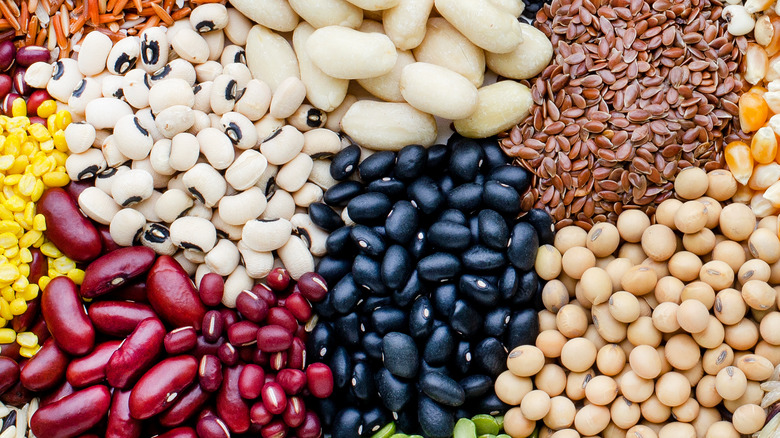Why Eating Beans Is Popular On Purim
Every March, tucked away in various pockets throughout the U.S., you'll find a subset of kids who are busily planning their costumes for the upcoming Jewish holiday of Purim. Purim is celebrated on the 14th day of the Hebrew month of Adar, which usually translates to sometime between late February and mid-March on the Gregorian calendar. This year, Purim falls on Wednesday, March 16, starting at sundown and continuing until sundown the next day (via Hebcal). As is traditional on Purim, children will be encouraged to dress up in costumes, eat sweets, and make lots of noise (via Jewish Community Federation).
In addition to costumes, candy, and general ruckus-making, Purim involves the participatory storytelling of the tale of a king, his wife, and a very bad prime minister named Haman in Ancient Persia. It also involves the eating of a festive meal that traditionally includes a generous portion of beans (via The Jerusalem Post).
The significance of beans on Purim
Many foods are associated with particular holidays because they represent some aspect of the holiday or the story behind it. For example, king cake is served during Mardi Gras because they symbolize unity among various faiths, according to New Orleans Showcase. Lamb is a favorite dish for Easter dinner because it represents Christ and sacrifice. Likewise, beans are associated with Purim because in the Purim story, the Persian king's secretly Jewish wife, Queen Esther, subsisted on beans and seeds in an effort to keep low-key kosher despite living in a palace where kosher food was not served. She had to keep her nationality and religion a secret; if prime minister Haman had his way, every Jew would have been eliminated post-haste (via Chabad.org).
Luckily, good Queen Esther outsmarted Haman, which is one of the concrete concepts that Purim celebrates (some of the more abstract concepts include serendipity, integrity, and the importance of having fun even when things are rough, per Reconstructing Judaism). It is in honor of Queen Esther and her self-imposed diet of beans and seeds, that Jewish families look to include beans and seeds in their festive Purim meal. Popular Purim bean and seed delivery systems include falafel, which is made with chickpeas, and poppy seed-filled triangularly shaped shortbread cookies known as Hamantaschan, which translates loosely to "Haman's hat," as Haman was apparently fond of wearing tri-cornered hats (via The Nosher).

